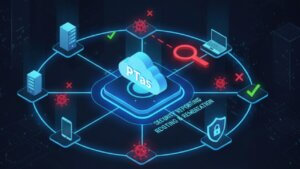Firewalls serve as the first line of defense against cyber threats, unauthorized access, and malicious activities. They play a crucial role in monitoring and controlling network traffic based on predefined security rules. Among the many types of firewalls, three of the most commonly used are Packet-Filtering Firewalls, Proxy Firewalls, and Stateful Inspection Firewalls. Understanding their functionality, strengths, and limitations is essential for making informed cybersecurity decisions.
Table of Contents
What is a Firewall?
A firewall is a network security device or software that filters incoming and outgoing traffic based on security rules. It acts as a barrier between trusted internal networks and untrusted external networks, such as the internet. Firewalls help prevent cyberattacks, data breaches, and unauthorized access by inspecting and regulating data packets passing through them.
The Types of Firewalls
Firewalls come in different forms, each with unique characteristics and functionalities. The three primary types of firewalls discussed in this article are Packet-Filtering Firewalls, Proxy Firewalls, and Stateful Inspection Firewalls. Understanding their distinctions is crucial for selecting the right firewall for specific security needs.
1. Packet-Filtering Firewalls
Definition
Packet-filtering firewalls are one of the oldest and simplest types of firewalls. They operate at the network layer (Layer 3) and transport layer (Layer 4) of the OSI model, analyzing packets of data based on predefined rules.
How It Works
A packet-filtering firewall examines key packet attributes such as:
Source and destination IP addresses
Port numbers
Protocol type (TCP, UDP, ICMP)
If a packet matches an allowed rule, it is forwarded; otherwise, it is blocked. This process is performed without inspecting the packet’s actual content.
Advantages
Speed & Efficiency: Low latency since packets are filtered quickly.
Low Resource Consumption: Minimal system overhead compared to advanced firewalls.
Basic Security: Provides a primary defense against unauthorized access.
Limitations
Lack of Deep Packet Inspection: Cannot inspect packet payloads, making it vulnerable to certain attacks.
Limited Stateful Awareness: Each packet is evaluated independently, which can be exploited by attackers.
Vulnerable to Spoofing: Attackers can manipulate packet headers to bypass filtering rules.
Use Cases
Small to medium-sized businesses with basic security needs.
Environments where speed and low resource usage are critical.
Initial security layer for network segmentation.
2. Proxy Firewalls (Application-Level Firewalls)
Definition
A proxy firewall, also known as an Application-Level Gateway, operates at the application layer (Layer 7) of the OSI model. Unlike packet-filtering firewalls, it does not allow direct communication between internal and external networks. Instead, it acts as an intermediary between users and the services they are trying to access.
How It Works
When a user requests access to a website or an online service, the proxy firewall receives the request, processes it, and forwards it to the destination server on behalf of the user. Similarly, responses from the destination server go through the proxy before reaching the user.
Advantages
Deep Packet Inspection: Can inspect the actual contents of packets, filtering based on keywords, file types, or application behavior.
Enhanced Anonymity: Masks internal IP addresses, improving privacy.
Protection Against Malicious Content: Can filter harmful websites, block malware, and enforce content policies.
Limitations
Latency Issues: Because it processes each request, performance can be slower compared to other firewalls.
High Resource Requirements: Requires significant computational power and memory.
Complex Configuration: Setting up rules and policies can be challenging, especially for large networks.
Use Cases
Organizations requiring content filtering and advanced security controls.
Secure web browsing environments in corporate and educational settings.
Protecting internal networks from external threats while maintaining anonymity.
3. Stateful Inspection Firewalls
Definition
Stateful inspection firewalls, also known as Dynamic Packet-Filtering Firewalls, provide a more sophisticated approach to filtering traffic by keeping track of active connections. They operate at multiple layers, including network, transport, and session layers.
How It Works
Unlike packet-filtering firewalls, stateful firewalls maintain a state table that records information about active connections. When a new packet arrives, the firewall checks whether it belongs to an existing, approved session. If it does, the packet is allowed through; otherwise, it undergoes additional scrutiny.
Advantages
Improved Security: Tracks connection states, making it harder for attackers to manipulate traffic.
Better Performance than Proxy Firewalls: Does not require as much processing power.
Flexibility: Can block unauthorized access while allowing legitimate traffic to pass smoothly.
Limitations
Resource Intensive: Maintaining a state table requires memory and processing power, which may impact performance.
Vulnerable to Advanced Attacks: While more secure than packet-filtering firewalls, they can still be susceptible to certain evasion techniques.
Complexity in Management: Requires proper configuration and monitoring to prevent misconfigurations.
Use Cases
Enterprise environments requiring balance between security and performance.
Securing internal networks from unauthorized access while maintaining connection tracking.
Protecting against session hijacking and unauthorized data transmission.
Comparison of Firewall Types
| Feature | Packet-Filtering Firewall | Proxy Firewall | Stateful Inspection Firewall |
|---|---|---|---|
| Layer of Operation | Network & Transport (Layers 3 & 4) | Application (Layer 7) | Network, Transport, & Session (Layers 3, 4, 5) |
| Deep Packet Inspection | No | Yes | No (but tracks session state) |
| Performance | High | Low (due to request processing) | Moderate |
| Security Level | Basic | High | Medium |
| Resource Consumption | Low | High | Moderate |
| Best Use Case | Basic filtering | Content filtering & anonymity | Stateful traffic monitoring |
Conclusion
Firewalls are an essential component of modern cybersecurity, protecting networks from unauthorized access and malicious activities. Packet-filtering firewalls offer a basic yet fast and efficient security mechanism. Proxy firewalls provide deep packet inspection and anonymity at the cost of performance. Stateful inspection firewalls strike a balance between security and efficiency by keeping track of active connections.
Choosing the right firewall depends on an organization’s security needs, performance requirements, and available resources. By understanding the strengths and limitations of these firewall types, businesses and individuals can implement robust security measures to protect their digital assets from cyber threats.
References
Why Businesses Trust SecureMyOrg for Comprehensive Network Security
At SecureMyOrg, we uncover and fix all possible security vulnerabilities of mobile and web, while providing solutions to mitigate risks. We are trusted by renowned companies like Yahoo, Gojek and Rippling, and with 100% client satisfaction, you’re in safe hands!







Some of the things people reach out to us for –
- Building their cybersecurity program from scratch – setting up cloud security using cost-effective tools, SIEM for alert monitoring, building policies for the company
- Vulnerability Assessment and Penetration Testing ( VAPT ) – We have certified professionals, with certifications like OSCP, CREST – CPSA & CRT, CKA and CKS
- DevSecOps consulting
- Red Teaming activity
- Regular security audits, before product release
- Full time security engineers.
Relevant Posts

Top Cybersecurity Threats Facing Businesses In 2026
Businesses entering 2026 face a security landscape that is more complex, more interconnected, and far less forgiving than in previous years. Cybersecurity threats no longer

Top 5 Security Weaknesses Cloud-Native Apps Commonly Ignore
Cloud-native applications promise speed, flexibility, and scalability. Teams ship features faster, infrastructure adapts automatically, and operational overhead drops. Yet many organizations discover later that security

Why Weak Serverless Application Security Puts Your Business at Risk
Weak security in serverless environments often goes unnoticed until it leads to real damage. Misconfigured triggers, broad permissions, and poor visibility can expose sensitive data and disrupt business operations. Understanding where the risks appear is the first step toward building safer, more reliable serverless applications.

What Is Penetration Testing as a Service?
Penetration testing as a service (PTaaS) lets experts simulate real attacks to uncover vulnerabilities before hackers do. This guide explains the process, benefits, and costs, helping businesses strengthen defenses with predictable, ongoing security checks.

How To Inspect Encrypted Traffic Without Breaking Privacy
Network administrators face a challenge: securing systems while respecting privacy. This guide explains how to inspect encrypted traffic without breaking privacy using metadata, anomaly detection, and machine learning ensuring visibility, compliance, and trust.

How to Audit Infrastructure as Code (IaC) for Security Vulnerabilities
Discover how to audit Infrastructure as Code (IaC) for security vulnerabilities with this practical guide. Learn to scan IaC files using tools like Checkov, fix issues like exposed resources, and integrate audits into CI/CD pipelines. Protect your cloud systems from misconfigurations and ensure compliance with clear, actionable steps.

